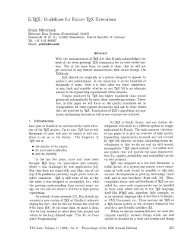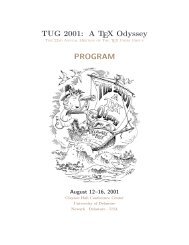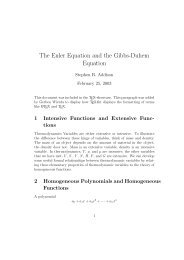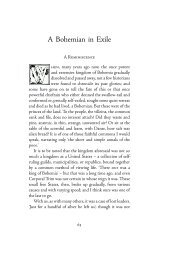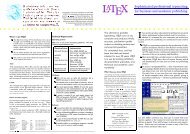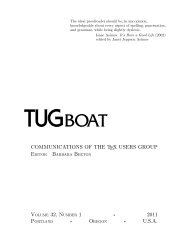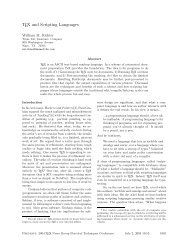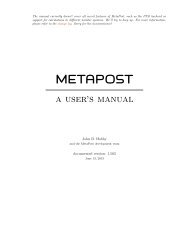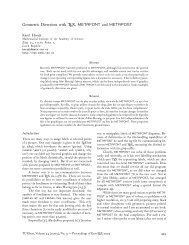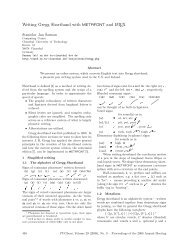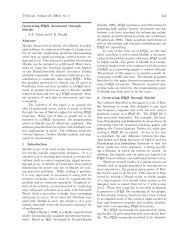The Communications of the TEX Users Group Volume 29 ... - TUG
The Communications of the TEX Users Group Volume 29 ... - TUG
The Communications of the TEX Users Group Volume 29 ... - TUG
Create successful ePaper yourself
Turn your PDF publications into a flip-book with our unique Google optimized e-Paper software.
Pascal MetaPost, but using CWEB as source language<br />
instead <strong>of</strong> Pascal WEB.<br />
After that was done, <strong>the</strong> real work started:<br />
• All <strong>of</strong> <strong>the</strong> global variables were collected into<br />
a C structure that represents an ‘instance’ <strong>of</strong><br />
MetaPost.<br />
• <strong>The</strong> Pascal string pool was stripped away so<br />
that it is now used only for run-time generated<br />
strings. Most internal functions now use normal<br />
C strings.<br />
• <strong>The</strong> PostScript backend was isolated from <strong>the</strong><br />
core <strong>of</strong> <strong>the</strong> program so that o<strong>the</strong>r backends can<br />
be added much more easily.<br />
• All <strong>of</strong> <strong>the</strong> exported functions now use a C namespace.<br />
• Where it was feasible to do so, MPlib uses dynamic<br />
memory allocation. <strong>The</strong>re are a few exceptions<br />
that will be mentioned later.<br />
• All input and output now uses function pointers<br />
that can be configured through <strong>the</strong> programming<br />
interface.<br />
• <strong>The</strong> MPlib library never calls exit() itself but<br />
instead returns to <strong>the</strong> calling program with a<br />
status indicator.<br />
4 Using <strong>the</strong> library from source code<br />
Using <strong>the</strong> MPlib library from o<strong>the</strong>r program code is<br />
pretty straightforward: first you set up <strong>the</strong> MPlib<br />
options, <strong>the</strong>n you create an MPlib instance with<br />
those options, <strong>the</strong>n you run MetaPost code from a<br />
file or buffer, and finally finish up.<br />
<strong>The</strong> options that can be controlled are:<br />
• various command-line options that are familiar<br />
frommpost, such as whe<strong>the</strong>r MetaPost starts in<br />
INI mode, <strong>the</strong> mem_name and job_name, ‘tr<strong>of</strong>f’<br />
mode, and <strong>the</strong> non-option part <strong>of</strong> <strong>the</strong> command<br />
line,<br />
• <strong>the</strong> size <strong>of</strong> <strong>the</strong> few remaining statically allocated<br />
memory arrays,<br />
• various function pointers like those for input<br />
and output, file searching, <strong>the</strong> generator function<br />
for typeset labels, and <strong>the</strong> ‘editor escape’<br />
function,<br />
• <strong>the</strong> start value <strong>of</strong> <strong>the</strong> internal randomizer,<br />
• and finally a ‘userdata’ pointer that is never<br />
used by MPlib itself but can be retrieved by <strong>the</strong><br />
controlling program at any time.<br />
<strong>The</strong> application programming interface at <strong>the</strong><br />
moment is very high-level and simplistic. It supports<br />
two modes <strong>of</strong> operation:<br />
• emulation <strong>of</strong> <strong>the</strong> command-linempost program,<br />
with traditional I/O and interactive error handling,<br />
MetaPost developments: MPlib project report<br />
• an interpreter that can repeatedly execute individual<br />
string chunks, with redirected I/O and<br />
all errors treated as if nonstopmode is in effect.<br />
For <strong>the</strong> string-based interpreter, <strong>the</strong>re are a few<br />
extra functions:<br />
• <strong>the</strong> runtime data can be fetched; this comprises<br />
<strong>the</strong> logging information and <strong>the</strong> internal data<br />
structure representation <strong>of</strong> any generated figures,<br />
• <strong>the</strong> instance’s error state can be queried,<br />
• <strong>the</strong> userdata pointer can be retrieved,<br />
• some statistics can be ga<strong>the</strong>red,<br />
• PostScript can be generated from <strong>the</strong> image<br />
output,<br />
• and some glyph information can be retrieved;<br />
this is useful if you want to create a backend<br />
yourself.<br />
4.1 Examples<br />
Here is a minimalistic but complete example that<br />
uses <strong>the</strong> mpost emulation method in C code:<br />
#include <br />
#include "mplib.h"<br />
int main (int argc, char **argv) {<br />
MP mp;<br />
MP_options *opt = mp_options();<br />
opt->command_line = argv[1];<br />
mp = mp_initialize(opt);<br />
if (mp) {<br />
int history = mp_run(mp);<br />
mp_finish(mp);<br />
exit (history);<br />
} else {<br />
exit (EXIT_FAILURE);<br />
}<br />
}<br />
Given <strong>the</strong> basic library functionality now available,<br />
it is reasonably straightforward to create bindings<br />
for o<strong>the</strong>r languages. We have done this for Lua,<br />
and here is a second example that uses <strong>the</strong>se Lua<br />
language bindings. <strong>The</strong> Lua bindings are always<br />
based on string execution, and <strong>the</strong> option setting<br />
and instance creation are merged into a single new<br />
function:<br />
local mplib, mp, l, chunk<br />
mplib = require(’mplib’)<br />
mp = mplib.new ({ini_version = false,<br />
mem_name = ’plain’})<br />
chunk = [[<br />
beginfig(1);<br />
fill fullcircle scaled 20;<br />
endfig;<br />
]]<br />
if mp <strong>the</strong>n<br />
<strong>TUG</strong>boat, <strong>Volume</strong> <strong>29</strong> (2008), No. 3 — Proceedings <strong>of</strong> <strong>the</strong> 2008 Annual Meeting 381



